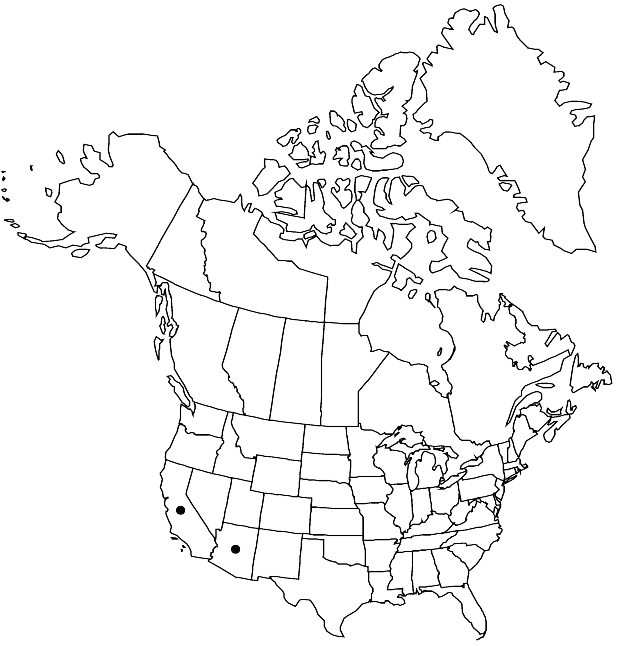Difference between revisions of "Peritoma jonesii"
Novon 17: 449. 2007.
FNA>Volume Importer |
imported>Volume Importer |
||
| (6 intermediate revisions by 2 users not shown) | |||
| Line 8: | Line 8: | ||
}} | }} | ||
|common_names=Jones bee-plant | |common_names=Jones bee-plant | ||
| − | |basionyms={{Treatment/ID/ | + | |basionyms={{Treatment/ID/Basionym |
|name=Cleome lutea var. jonesii | |name=Cleome lutea var. jonesii | ||
|authority=J. F. Macbride | |authority=J. F. Macbride | ||
| + | |rank=variety | ||
| + | |publication_title=Contr. Gray Herb. | ||
| + | |publication_place=65: 39. 1922 | ||
}} | }} | ||
|synonyms={{Treatment/ID/Synonym | |synonyms={{Treatment/ID/Synonym | ||
|name=Cleome jonesii | |name=Cleome jonesii | ||
|authority=(J. F. Macbride) Tidestrom | |authority=(J. F. Macbride) Tidestrom | ||
| + | |rank=species | ||
}} | }} | ||
|hierarchy=Cleomaceae;Peritoma;Peritoma jonesii | |hierarchy=Cleomaceae;Peritoma;Peritoma jonesii | ||
| Line 30: | Line 34: | ||
|elevation=300-1200 m | |elevation=300-1200 m | ||
|distribution=Ariz.;Calif.;Mexico (Baja California). | |distribution=Ariz.;Calif.;Mexico (Baja California). | ||
| − | |discussion=<p>Often treated as a variety of Peritoma lutea, P. jonesii grows at lower elevations, has a more southerly (though overlapping) range (T. H. Kearney and R. H. Peebles 1960), and differs in morphological features. Most notable are its larger, showier flowers and longer capsules.</p> | + | |discussion=<p>Often treated as a variety of <i>Peritoma lutea</i>, <i>P. jonesii</i> grows at lower elevations, has a more southerly (though overlapping) range (T. H. Kearney and R. H. Peebles 1960), and differs in morphological features. Most notable are its larger, showier flowers and longer capsules.</p> |
|tables= | |tables= | ||
|references= | |references= | ||
| Line 39: | Line 43: | ||
-->{{#Taxon: | -->{{#Taxon: | ||
name=Peritoma jonesii | name=Peritoma jonesii | ||
| − | |||
|authority=(J. F. Macbride) H. H. Iltis | |authority=(J. F. Macbride) H. H. Iltis | ||
|rank=species | |rank=species | ||
| Line 54: | Line 57: | ||
|publication year=2007 | |publication year=2007 | ||
|special status= | |special status= | ||
| − | |source xml=https:// | + | |source xml=https://bitbucket.org/aafc-mbb/fna-data-curation/src/2e0870ddd59836b60bcf96646a41e87ea5a5943a/coarse_grained_fna_xml/V7/V7_276.xml |
|genus=Peritoma | |genus=Peritoma | ||
|species=Peritoma jonesii | |species=Peritoma jonesii | ||
Latest revision as of 22:32, 5 November 2020
Annuals, 50–100(–200) cm. Stems sparsely branched distally; glabrous or glabrate. Leaves: petiole 1.5–4.5 cm; leaflets 5, (proximal ones sometimes early deciduous), blade linear to elliptic, 1.5–4(–6) × 0.4–1.3 cm, margins serrate, apex long-acuminate, surfaces glabrous. Racemes 1–3 cm (6–40 cm in fruit); bracts unifoliate, obovate to spatulate, 2–15 mm. Pedicels 7–15 mm. Flowers: sepals persistent, connate ca. 1/2 of length, yellow, lanceolate, 1.6–2.6 × 0.8–1.2 mm, margins denticulate, glabrous; petals golden yellow, oblong to ovate, 10–13 × 2–4 mm; stamens yellow, 20–30mm; anthers 1.9–2.6 mm; gynophore 15–25 mm in fruit; ovary 3–6 mm; style 0.5–0.8 mm. Capsules not inflated, 40–60 × 2–5 mm, striate. Seeds 15–30, gray to black, triangular (sharply angled), 3–4 × 2.5–3 mm, rugose.
Phenology: Flowering summer.
Habitat: Dry sandy flats, desert scrub, roadsides
Elevation: 300-1200 m
Distribution

Ariz., Calif., Mexico (Baja California).
Discussion
Often treated as a variety of Peritoma lutea, P. jonesii grows at lower elevations, has a more southerly (though overlapping) range (T. H. Kearney and R. H. Peebles 1960), and differs in morphological features. Most notable are its larger, showier flowers and longer capsules.
Selected References
None.